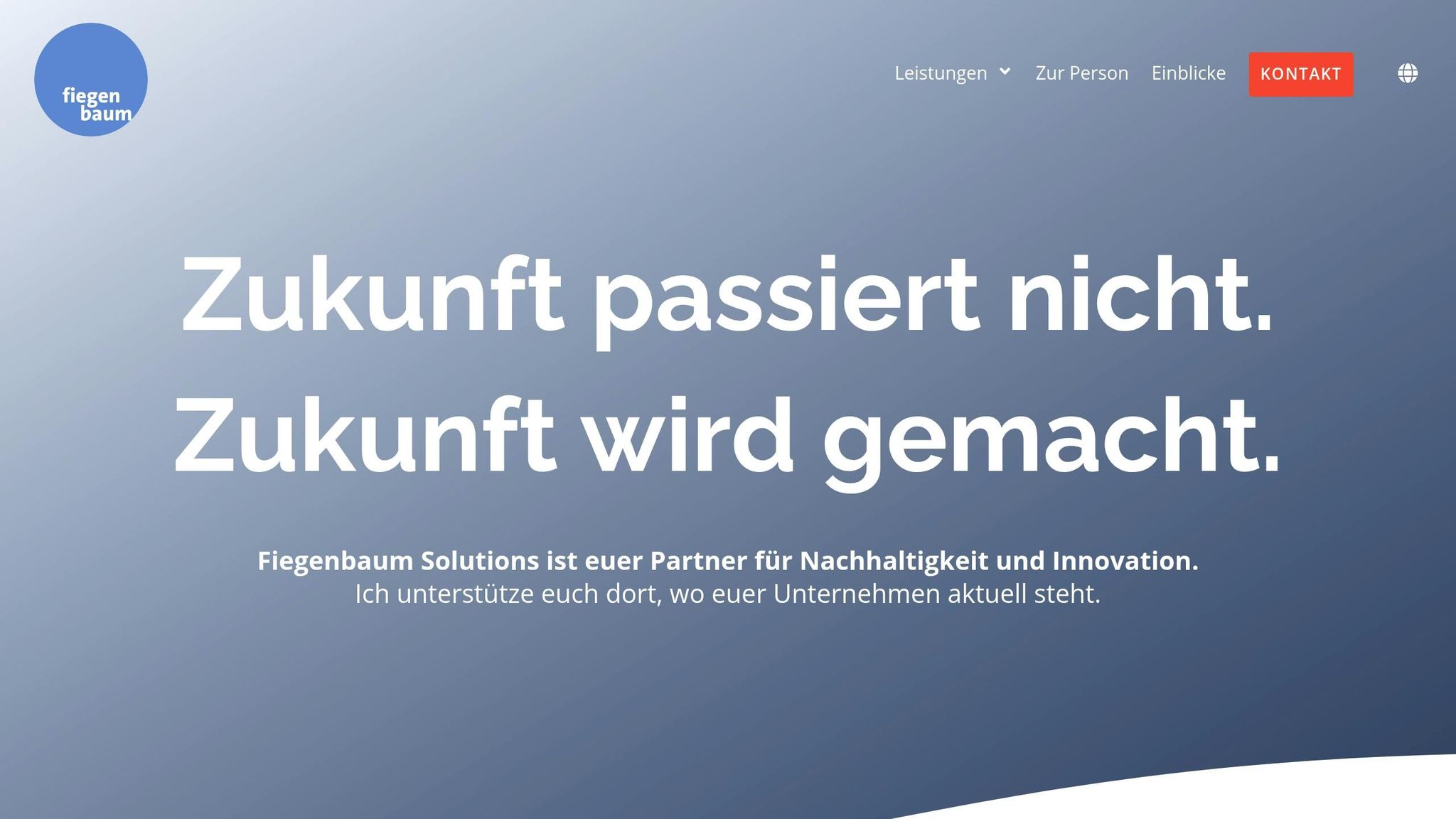Essential ESG Metrics for Climate VCs in 2026: CO₂ Intensity, Avoided Emissions, and Social Impact
Want to know which ESG metrics will be crucial for Climate VCs in 2026? The answer is clear:...
By: Johannes Fiegenbaum on 9/19/25 4:39 PM

ESG criteria have long been indispensable for venture capital firms. Why? They minimize risks, increase company value, and meet regulatory requirements. Startups with strong ESG profiles convince through efficiency, lower risks, and attractive financing options.
Key points at a glance:
Our conclusion: ESG is not just an obligation, but a real competitive advantage – for startups and investors alike.
A central aspect in evaluating startups is their carbon footprint. Both direct and indirect emissions (Scope 3) should be considered. It's particularly positive when a company pursues scientifically-based climate targets, such as "carbon neutral by 2030" or alignment with the standards of the Science Based Targets initiative (SBTi).
A startup's resource efficiency can be evaluated using metrics such as energy and water consumption per revenue unit. Companies committed to the circular economy score points through waste reduction and material reuse measures. Life cycle analyses (LCA) provide a holistic view by analyzing environmental impacts from raw material extraction to disposal.
The topic of biodiversity is also gaining importance, particularly against the backdrop of new regulatory requirements. Measures in this area should be considered in the context of the overall ESG assessment, as they are closely linked to social and economic factors.
Social aspects such as diversity, employee well-being, and supply chain transparency are crucial for a startup's sustainable value creation. In addition to gender distribution in leadership positions, ethnic diversity in the team and pay equality between men and women should also be analyzed.
Employee well-being can be measured through indicators such as turnover rates, sick leave, and satisfaction surveys. Flexible work models, mental health promotion programs, and fair compensation have become standard – especially in the German startup landscape.
Another important point is social engagement. Activities such as local partnerships, educational initiatives, or charitable projects should authentically align with the company's core business and not serve as mere PR measures.
Data protection also plays a central role: Compliance with GDPR and proactive data protection measures are essential. Certifications such as ISO 27001 or SOC 2 signal that a startup meets high standards. Additionally, the Supply Chain Due Diligence Act in Germany requires proof that suppliers respect human rights and provide fair working conditions.
Governance factors are particularly relevant for VCs as they both meet regulatory requirements and minimize risks. A well-positioned startup should have clear processes for compliance, financial reporting, and risk management.
Effective compliance structures include policies, a code of conduct, and regular training. Anti-corruption measures and functioning whistleblower systems that can detect misconduct early are particularly important.
The composition of bodies such as the supervisory board or advisory board is also crucial. Especially in the early phase of a company, it's helpful when these bodies combine diverse competencies and include independent members.
Solid risk management shows how a company systematically deals with uncertainties. This includes identifying potential ESG risks, developing contingency plans, and regularly reviewing the risk situation.
Finally, it's important that startups pursue ethical business models. This means fair prices, transparent marketing strategies, and – especially for tech startups – clear communication about algorithms and protection against discrimination by AI systems. Such approaches build trust and contribute to long-term success.
Evaluating ESG criteria requires structured approaches that go beyond purely subjective assessments. Modern venture capital firms rely on a combination of quantitative scoring systems, data-driven analysis tools, and regulatory compliance checks. This allows ESG performance to be objectively captured and informed investment decisions to be made.
It's crucial to combine different assessment approaches while considering both current performance and potential for future development. Particularly important: The assessment should always be adapted to the development stage of the respective startup. A pre-seed company naturally cannot meet the same ESG standards as an established scale-up. In the following, we'll look at specific methods to systematically implement comprehensive assessment.
Standardized scoring systems provide a structured foundation for evaluating ESG aspects. In Germany, for example, there are approaches specifically tailored to small and medium-sized enterprises (SMEs). Such systems evaluate ESG performance based on various categories while considering industry-specific weightings and the respective company phase.
A good scoring system captures not only absolute values but also relative improvements and progress – particularly relevant for startups that are often in a dynamic development phase. Industry-specific adjustments are essential: While FinTech startups are primarily measured on social and governance aspects, CleanTech companies focus on environmental impacts. The weighting should be based on a materiality analysis that identifies the most important ESG factors for the business model and relevant stakeholders.
Practical checklists are another valuable tool. They structure the due diligence process and ensure that critical aspects are not overlooked. Both measurable facts such as certifications and compliance evidence as well as soft factors such as corporate culture, leadership style, and stakeholder dialogue should be considered.
In addition to quantitative scoring approaches, qualitative methods are gaining importance to better represent future developments. Life cycle analyses (LCA) provide a comprehensive assessment of a startup's environmental impacts. Modern LCA tools can be used even in early company phases to quantify potential environmental impacts and identify improvement opportunities. Prospective LCAs that simulate various scaling scenarios are particularly helpful.
For impact startups, the Theory of Change method is a useful tool. It visualizes the impact chain – from input through activities and outputs to short-, medium-, and long-term results. This approach helps distinguish realistic impact statements from exaggerated promises.
Scenario analyses are indispensable for evaluating climate risks and adaptation strategies. Various future scenarios are simulated, from optimistic 1.5°C pathways to pessimistic scenarios with 3°C warming. Startups that align their business models with such scenarios demonstrate strategic foresight and adaptability.
It's important that quantitative impact metrics are supplemented by qualitative assessments. Impressive figures on savings or improvements must be supported by plausibility checks and comparison with industry benchmarks to make the actual impact comprehensible.
From 2026, the CSRD (Corporate Sustainability Reporting Directive) will also be relevant for startups, especially when they act as suppliers to larger companies. VCs should therefore already check whether their portfolio companies are prepared for these requirements – for example, through the use of data collection systems that enable CSRD-compliant reporting.
The EU Taxonomy Regulation also plays an increasingly important role. Startups whose business activities are classified as environmentally sustainable have better chances of attracting institutional investors. Taxonomy compliance should therefore be a fixed component of due diligence.
Another topic is the Supply Chain Due Diligence Act (LkSG), which primarily affects B2B startups. VCs should check whether their target companies can meet their customers' requirements regarding human rights and environmental standards.
In addition, compliance with the General Data Protection Regulation (GDPR) is a must. VCs should also pay attention to whether companies are prepared for future regulations such as the AI Act. Proactive compliance strategies demonstrate professional risk management and can simultaneously create competitive advantages.
Integrating regulatory requirements into the due diligence process requires continuous monitoring. What appears optional today may be mandatory tomorrow. VCs who recognize this dynamic early and support their portfolio companies accordingly secure better decision-making foundations for their investments in the long term.
Digitalization is rapidly changing ESG assessment. Software solutions automate data collection processes and enable you to systematically and comparably evaluate ESG criteria. Many of these tools are already tailored to EU regulations such as CSRD and the EU Taxonomy.
The choice of suitable tools depends heavily on your investment focus and fund size. Smaller funds often benefit from modular solutions, while larger firms rely on comprehensive platforms that map the entire due diligence process. It's important that the tools not only meet current requirements but can also be adapted to future regulatory developments. In the following, we'll present some specific digital tools for different ESG requirements.
ESG data management platforms are now the heart of modern ESG assessments. They collect, structure, and analyze ESG data from diverse sources – from company surveys through public databases to satellite imagery for environmental data.
Platforms with automated data validation are particularly practical, checking incoming data for plausibility and marking inconsistencies or gaps. This saves time, reduces errors, and minimizes manual effort. Some systems even use AI to extract data from unstructured sources such as sustainability reports or press releases.
Cloud-based reporting tools enable you to create ESG reports in real-time and share them with your portfolio companies. Interactive dashboards address different target groups – from detailed analyses for the investment team to clear summaries for limited partners. Integration with common CRM and portfolio management systems is particularly useful.
For German VCs, reporting obligations under the Supply Chain Due Diligence Act are particularly relevant. Here, platforms support systematic collection of ESG data and identification of risks in your portfolio companies' supply chains. Risk mitigation measures can be documented directly.
In addition to data-driven reporting tools, solutions for life cycle analysis (LCA) and climate risk assessment play a central role.
LCA software for startups has developed significantly in recent years. Even with limited data, these tools provide meaningful analyses – a real advantage for early-stage investments. They work with database-supported estimates and Monte Carlo simulations to transparently represent uncertainties.
Particularly helpful are flexible LCA tools that adapt to different development phases. In early phases, simplified screening LCAs are often sufficient, which can later be supplemented by more detailed analyses. Some platforms even offer prospective functions that map different scaling scenarios and forecast their environmental impacts.
Climate risk analysis software is becoming increasingly important for VCs, as physical and transitional climate risks can have significant impacts on companies. These tools combine climate models with company data to create detailed risk profiles. Both acute risks such as extreme weather events and long-term changes such as rising average temperatures are considered.
Some platforms offer scenario tests that simulate different climate pathways (1.5°C, 2°C, 3°C+). This helps you assess the resilience of your portfolio companies under different future scenarios. Tools that also suggest adaptation strategies and analyze their cost-benefit ratio are particularly valuable.
The following overview helps you select the right tools for your requirements:
| Category | Main Functions | Suitable for | EU Compliance | Typical Costs |
|---|---|---|---|---|
| Data Management Platforms | Data collection, validation, dashboards | All VC sizes | CSRD, EU Taxonomy, Supply Chain Act | €5,000 - €50,000/year |
| LCA Software | Life cycle analyses, impact modeling | Tech and hardware startups | EU Taxonomy, Ecodesign Regulation | €2,000 - €20,000/year |
| Climate Risk Tools | Risk assessment, scenario analysis | Industries with physical assets | TCFD, EU Taxonomy | €10,000 - €100,000/year |
| Integrated ESG Suites | Complete due diligence coverage | Large VC funds (>€100 million) | All relevant regulations | €25,000 - €200,000/year |
| Specialized Compliance Tools | Regulatory reporting | Regulation-intensive industries | CSRD, Supply Chain Act, SFDR | €3,000 - €30,000/year |
Implementing digital ESG tools requires a well-thought-out strategy. Training effort and time for establishing new processes are often underestimated. Gradual implementations that start with a pilot project and then gradually expand to the entire portfolio are usually successful.
Integration and data quality are the biggest stumbling blocks. Even the best tools are of little use if data quality is inadequate or systems cannot communicate with each other. When selecting, pay particular attention to API interfaces and standardized data formats to avoid later integration problems.
The assessment methods and digital tools presented form a solid foundation for making concrete ESG successes visible in practice. Here, theory is put into practice: The integration of ESG principles can not only create measurable value but also secure long-term competitive advantages. Some startups in Germany and the EU have impressively proven this. Their stories show how VCs can specifically support ESG value creation.
A Berlin company incorporated ESG principles early into its business strategy and consistently integrated them into its core activities. An example of this is sustainable reforestation projects directly linked to the core business. Through transparent communication and clear positioning, the company was able to sustainably strengthen trust among customers and investors. Every strategic decision is examined for its impact on environment and society. The result? Closer customer loyalty and continuous, self-financed growth based on solid ESG principles.
Another example shows how ESG measures can be used as a differentiating feature. A Berlin foodtech startup specializing in animal-free dairy products has placed ESG compliance at the center of its strategy. Through ambitious sustainability goals in the production process and throughout the entire corporate strategy, the company's ecological footprint could be significantly reduced. This early focus on ESG enabled the startup to meet the growing demands of investors and trading partners and establish itself as a pioneer in sustainable food.
These case studies make it clear: Consistent ESG integration leads not only to better economic results but also to long-term competitive advantages – exactly the aspects that can be uncovered through systematic assessment methods.

Fiegenbaum Solutions offers practice-oriented ESG consulting for VCs and startups that goes beyond pure theory. Successfully implementing ESG strategies requires not only expertise but also solutions tailored to individual needs. As a boutique consultancy by Johannes Fiegenbaum, the company combines current market insights, regulatory know-how, and entrepreneurial thinking. This combination forms the foundation for the customized consulting approaches we offer you.
Our services are specifically tailored to the requirements of the German and European markets. While VCs are increasingly confronted with requests for lifecycle assessments, Fiegenbaum Solutions develops practical and economically sensible solutions that meet both regulatory requirements and real challenges.
The first step to an effective ESG strategy is analyzing a company's current market position and regulatory requirements. Fiegenbaum Solutions creates individual ESG roadmaps that consider both short-term compliance goals and long-term growth strategies. These strategies are closely linked to startups' business models to create sustainable and scalable growth opportunities.
Particularly interesting for VCs: We support you in evaluating your portfolio. Our approach helps identify ESG potential early and derive concrete value creation strategies from it. We translate environmental, social, and governance factors into tangible business opportunities.
Strategic planning doesn't end with theory – it leads to concrete assessment and implementation processes. The increasing demand for lifecycle assessments (LCAs) presents many VCs with challenges. Fiegenbaum Solutions addresses this development with a pragmatic approach that considers both costs and different LCA results. Our assessment procedures meet CSRD and EU Taxonomy requirements without overwhelming startups.
Our focus is on practical solutions. From initial compliance assessment to implementing reporting systems, we support you in transforming regulatory requirements into tangible competitive advantages. Our strength lies in translating complex regulations into implementable business processes.
In addition to strategic consulting, we offer data-based analyses that create solid decision-making foundations. With advanced impact modeling and scenario analyses, we support VCs in making informed investment decisions. Our analyses help evaluate sustainable business models and continuously monitor ESG performance.
Flexibility is important to us. We offer consulting models tailored exactly to your needs – from specific projects to long-term strategic support. For startups in early development phases, we have special conditions that meet the requirements of impact-oriented companies.
Thanks to our transparent pricing, you can plan ESG consulting as a strategic investment. After an initial conversation, you receive a clearly structured offer with timeline and complete cost transparency. This way, you know exactly what you're getting into and can plan your next steps confidently.
Venture capital companies can effectively integrate ESG criteria into their investment decisions by using clear assessment frameworks and appropriate tools. These should be specifically tailored to German ESG standards and regulatory requirements. It's crucial to identify ESG risks early and examine potential investments for compliant and sustainable practices.
A structured approach could consider the following aspects:
This approach not only ensures legal requirements are met but also helps create long-term value and strengthen stakeholder trust.
For ESG due diligence of startups, there are now numerous digital tools specifically designed to analyze sustainability and governance criteria. Platforms that combine functions such as data analysis, risk assessment, and sustainability management are particularly helpful.
Some solutions have proven particularly useful as they not only efficiently evaluate ESG metrics but also help comply with regulatory requirements. These tools enable informed decisions by making ESG risks visible early while identifying opportunities that can create long-term value.
Startups in Germany can analyze their ESG performance using specialized tools such as ESG reporting and monitoring software. These tools capture key metrics including CO₂ emissions, energy consumption, and diversity. A well-thought-out ESG strategy that includes both legal requirements and stakeholder expectations helps reduce risks and create sustainable value.
To improve ESG performance, it's advisable to conduct regular reviews, define clear goals, and implement appropriate measures. Open communication with investors also plays an important role. When sustainability principles are consistently integrated into corporate strategy, this strengthens long-term trust and perception as a reliable partner.

ESG and sustainability consultant based in Hamburg, specialised in VSME reporting and climate risk analysis. Has supported 300+ projects for companies and financial institutions – from mid-sized firms to Commerzbank, UBS and Allianz.
More aboutWant to know which ESG metrics will be crucial for Climate VCs in 2026? The answer is clear:...
Sustainability is now a crucial factor for company value—especially during exits and acquisitions....
Climate risks are no longer a thing of the future – they directly affect you as venture capital...